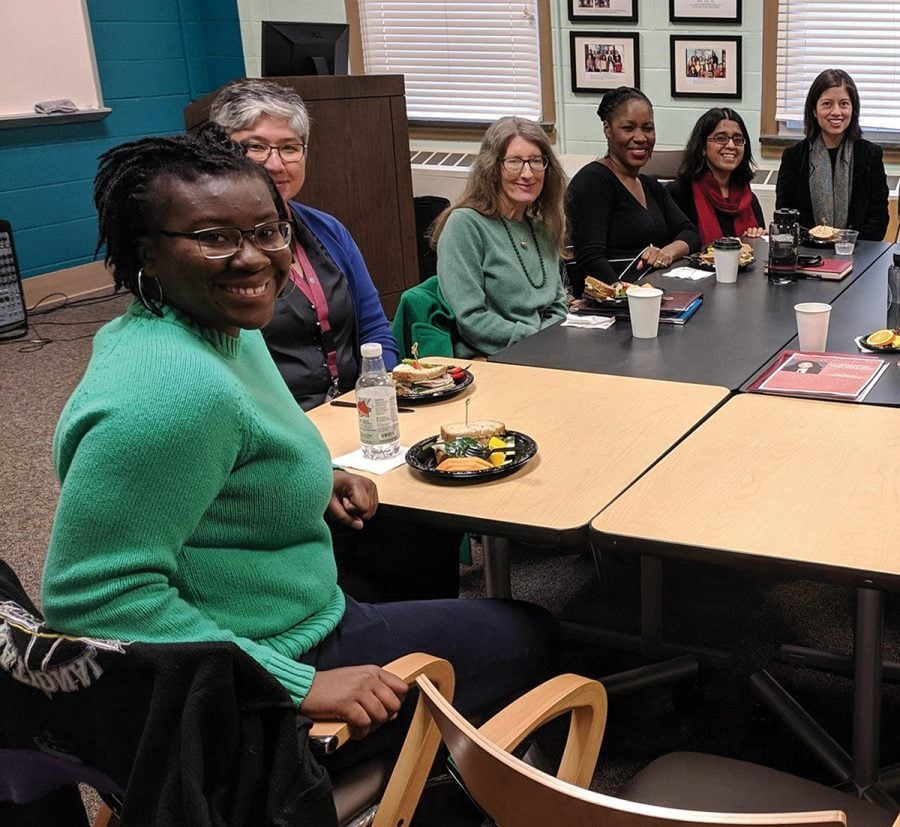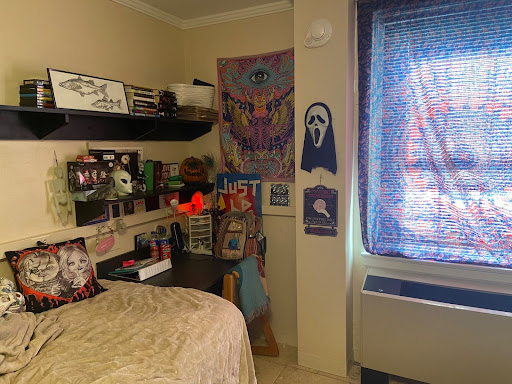Oberti Noguera shares investing tips
Students, faculty and staff pose during the community lunch with the founder and CEO of Pipeline Angels, Natalia Oberti Noguera. Pipeline Angels holds summits for angel investors and women and non-binary femme social entrepreneurs.// Photo courtesy Natalia Oberti Noguera
On Monday, Nov. 26, Natalia Oberti Noguera, founder and CEO of Pipeline Angels, spoke with members of the Guilford community from 12:00 p.m. to 1:00 p.m. in King Hall. This community lunch, sponsored by The Guilford College Center for Principled Problem Solving, allowed attendees to gain insight into social entrepreneurship.
“I’m curious to see what she has learned from her experience and what transformative moments she has had in her learning,” said Zulfiya Tursunova, assistant professor for Peace and Conflict Studies.
At the beginning of the community lunch, attendees were given an opportunity to ask Oberti Noguera any questions that they had.
“I am curious about what has made (her) so motivated,” said Community Director Jenny Bingham. “I think that it’s so easy to just fall in line with everybody else, but what makes (her) motivated every day?”
Oberti Noguera shared her experiences, advice and feedback with the community as she answered questions.
“It is super hard to be a founder,” Oberti Noguera said. “Not everyone makes it. I think it’s four to five startups fail within the first six months. That’s heavy duty, and so for any of you who are currently students who are thinking about exploring and being an entrepreneur, one of the things that I like to say is to do it while you are in school.
“Because if you fail, then maybe you were at least able to do it for a credit or use it for a project. Or, you could start something new in the community by using the lessons you learned from your mistakes.”
Throughout the community lunch, Oberti Noguera worked to share important lessons that she has learned from being a social entrepreneur.
“What I often say is that we often talk about best practices, without talking about how best practices come from our best mistakes,” Oberti Noguera said. “One of the things that I have been making and effort to do a lot is to talk about those best mistakes.”
Oberti Noguera shared examples of some of her best mistakes with attendees, as well as the important lessons that she learned from them.
“I’m always impressed with strong powerful women,” said Paula Hernandez, interim assistant director of Intercultural Engagement Center and Latinx community coordinator. “So I wanted to know what got (her) to that point. What made (her) say that (she was) going to be a strong woman and entrepreneur.”
Oberti Noguera discussed that although being a founder and entrepreneur is difficult and risky, it also has many benefits and opportunities to shift the culture of social entrepreneurship and investing.
“I am my own boss, I have my own agency,” Oberti Noguera said. “So for me it was really important, as a founder, to be much more vocal, because I wanted to create a culture and change the current culture.”
During the community lunch, Immigrant Student Coordinator Liz Torres Melendez asked Oberti Noguera about the role of the undocumented community in entrepreneurship.
“A lot of undocumented folks are kind of forced to become entrepreneurs because that, for a lot of people, is the only way that they can get employed,” said Torres Melendez.
Oberti Noguera responded to this by pointing out that while there has been a significant increase in LatinX entrepreneurs, much of that increase can be attributed to the community being pushed out of the business sector.
“It’s not always that someone became a founder because they were passionate about something,” Oberti Noguera said. “Sometimes it is because the system is not working. We cannot actually work within the system, so we are being made to choose to work outside the system and create our own system.”
In addition to discussing entrepreneurship in relation to the undocumented and LatinX community, Oberti Noguera also spoke on her reasons for persisting through the challenges she experienced as a social entrepreneur.
“I often tell people that entrepreneurs don’t get asked why we stay,” Oberti Noguera said. “We get asked why we start, but not why we stay. I think that because it is so hard to be an entrepreneur, it is just as important to talk about why we stay.”
Of the many topics Oberti Noguera spoke on at the community lunch, she made sure to stress the importance of awareness and working to change the business sector rather than perpetuating it.
“I want to make sure that we are not perpetuating the systems that we are aiming to disrupt,” Oberti Noguera said. “Something that I’ve noticed is that a lot of women that are becoming investors and investing in other women, and that is often being translated to white women investing in white women. And I don’t think that’s the answer.”









